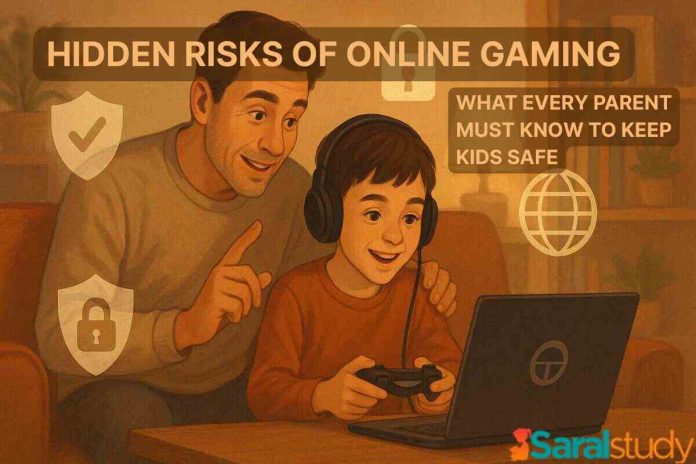Online gaming has rapidly become one of the most popular pastimes among children. Whether it’s multiplayer mobile games , PC adventures or console challenges , kids are spending more time than ever in the virtual world . On the surface, gaming seems entertaining and even educational – improving hand- eye coordination , teamwork and problem – solving skills.
But beneath the excitement , there are hidden risks that many parents overlook . The modern gaming world is connected , interactive and often unmonitored – opening doors to strangers, data privacy concerns and financial traps .
As technology advances, so must our awareness . In this blog, we’ll explore the biggest risks of online gaming for children , explain why it needs extra parental attention and share practical steps to make gaming a safe, balanced and positive experience for your child.
Why Online Gaming Needs Extra Attention
Children today are digital natives – they learn , play and socialize online. While this offers benefits , it also blurs the line between fun and exposure to real-world dangers . Let’s look at why online gaming deserves a closer look from parents .
Constant Online Interaction
Unlike older single-player games , most modern games are built for social interaction . Voice chats, multiplayer rooms and open forums connect kids with people from all over the world . While this can help build communication skills , it also exposes them to strangers who may not have good intentions .
Many predators use gaming platforms to build trust through friendly conversation – a method known as online grooming . Without supervision , children might share personal information or get emotionally manipulated .
Easy Access to Unsafe Content
Not all games are child-friendly . Many popular titles include violence, gambling – like features or adult – themed conversations in online lobbies. Exposure to such content at a young age can influence behavior, desensitize kids to aggression or create unrealistic expectations of the world.
That’s why age ratings (like PEGI or ESRB) exist – but most parents rarely check them. Children often download games recommended by friends or influencers without realizing the hidden mature content they contain.
Money Traps and In-App Purchases
Many free-to-play games make their profits through microtransactions – small in-game purchases that unlock items, upgrades or skins. These purchases can seem harmless , but for a child, they can quickly become addictive .

Games often use psychological tricks like “loot boxes”, limited-time offers or bright reward animations to encourage spending . Kids may not understand the real-world value of the money they spend, leading to unexpected bills and dependency on constant digital rewards .
Common Risks of Online Gaming for Children
Let’s break down the biggest risks of online gaming – and why awareness is the first step toward prevention .
Exposure to Strangers
Many multiplayer games have open chat systems where players can interact freely . This feature, while exciting becomes risky when children chat with unknown players .
Online predators often pretend to be kids themselves , gradually earning trust before asking for photos , private information or even moving the conversation to another app.
This is one of the most serious risks of online gaming – and it can happen silently even while parents believe their child is “just playing.”
Cyberbullying and Toxic Behavior
In competitive gaming environments, emotions run high . Unfortunately, this often leads to insults, name – calling or bullying from other players. Children may be mocked for losing, their gender or even their voice on voice chat.

Such experiences can hurt a child’s confidence and mental health . They might hide the bullying from parents out of embarrassment or fear. Over time, constant exposure to negativity can lead to anxiety , stress or withdrawal from real-life activities .
Addiction and Screen Overuse
Game developers design their products to keep players hooked . Features like daily rewards, streaks and level progression keep kids playing longer to avoid missing out .
While gaming in moderation is fine , excessive screen time can impact sleep , focus and studies.
Children who spend hours gaming often show signs of reduced concentration , irritability and less interest in outdoor play or social interaction . The World Health Organization (WHO) even recognizes “gaming disorder” as a behavioral issue when playtime begins to interfere with daily life.
Unsafe or Accidental Purchases
Online games are designed to feel immersive , often making children forget they’re using real money . Many games save payment details automatically , allowing instant purchases with just one click .
Without parental oversight , children might unknowingly buy expensive items or subscriptions . What begins as harmless fun can end with large credit card charges or unauthorized app store bills .
Privacy and Data Collection Risks
Most games today require account creation which means collecting personal data such as names, birthdates or email addresses. Some even track location for in-game features .
Children without realizing it may share private details on gaming profiles or chats. This can expose them to targeted ads, scams or identity theft .
It’s important to teach kids that personal information – even usernames – can reveal more than they think.
How Parents Can Keep kids safe from risks of online gaming
Thankfully, protecting children in the digital world is not about banning games – it’s about balance, awareness and involvement. Here’s how parents can make gaming both fun and safe.
Set Time Limits
Establish clear rules about gaming hours. For example 1–2 hours per day after homework or on weekends .
Encourage regular breaks every 30 – 40 minutes to rest your eyes and stretch. Use built-in parental control tools or apps to enforce these limits gently.
Monitor Game Content
Before allowing a new game, check age ratings and reviews. Platforms like Google Play and PlayStation display this clearly.
Play a few rounds with your child or watch gameplay videos to understand what they’re experiencing. If a game includes violence or mature chatrooms, suggest age – appropriate alternatives.
Use Parental Controls to avoid risks of online gaming
Every major gaming platform – from Xbox to mobile devices – includes parental control options. These allow you to:
- Restrict purchases
- Limit screen time
- Filter communication settings
- Block explicit content
- Taking a few minutes to enable these settings can prevent major problems later.
Talk About Online Strangers
Have an open, judgment-free discussion about the internet. Teach your child to never share personal details, photos or social media handles with anyone they meet in a game. Encourage them to come to you if someone makes them uncomfortable online. The more comfortable your child feels talking to you, the safer they’ll be from risks of online gaming.
Encourage a Balanced Lifestyle
Gaming can be a great way to relax, but it should never replace outdoor play, reading or family time. Encourage offline hobbies like sports, drawing or music. Balance teaches children self-control and helps them enjoy gaming responsibly.
Top 5 Most Asked Questions About the Hidden Risks of Online Gaming for Kids
Que. What are the hidden risks of online gaming for children?
Ans. Online gaming can be fun and engaging, but it also comes with several hidden dangers. Children may be exposed to inappropriate content, online predators, scams and cyberbullying. Many games collect user data or include in-app purchases, leading to privacy risks and financial loss. The constant exposure to violent or addictive content can also affect a child’s emotional development. Parents should regularly monitor gameplay and discuss safe online habits with their kids.
Que. How does excessive online gaming affect a child’s mental health and behaviour?
Ans. Excessive gaming can have serious consequences on a child’s mental health and social behaviour. It may lead to gaming addiction, anxiety, sleep disorders and reduced academic performance. Some children become isolated and prefer the virtual world over real-life interactions, affecting communication and emotional intelligence. Experts recommend setting daily screen-time limits and encouraging outdoor and family activities to maintain balance.
Que. Can online games expose children to cyberbullying and online predators?
Ans. Yes. Many online games allow anonymous chatting and messaging, which creates a risk of cyberbullying and online grooming. Players can send harmful messages, share offensive content or manipulate children into revealing personal information. Online predators often use gaming platforms to build trust and exploit children. Parents should ensure games have restricted chat options, teach kids to never share personal details and report suspicious behaviour immediately.
Que. What steps can parents take to keep their kids safe from risks of online gaming?
Ans. Parents can take several effective steps to protect their children:
- Use parental control tools and content filters.
- Set clear gaming time limits and encourage healthy screen habits.
- Keep gaming devices in common family areas instead of private rooms.
- Teach children about privacy, safe chatting, and recognizing scams.
- Stay involved — play games with your child occasionally to understand their online environment.
Creating open communication is the key — children who trust their parents are more likely to report issues early.
Que. Are all online games have risks of online gaming or some also have educational benefits for children?
Ans. Not all online games are harmful. In fact many games promote creativity, problem-solving, teamwork and decision-making skills. Educational games can help children learn maths, science and languages in an engaging way. The key is moderation and supervision. Parents should research games beforehand, choose age-appropriate educational games and ensure the gaming experience stays positive and balanced.
Final Tip for Parents
Online gaming isn’t the enemy — unmonitored and excessive gaming is. By staying informed, setting boundaries and maintaining open dialogue, parents can ensure that children enjoy the benefits of gaming while staying safe from its hidden risks of online gaming.
Also Read: How to Recognize and Prevent Online Scams Targeting Kids
The Role of Parents in Digital Literacy – Guiding Kids for a Smarter Online Future





